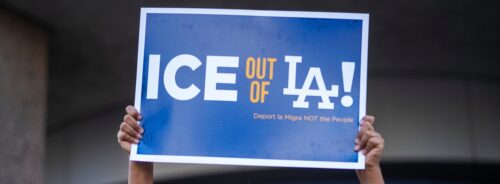The American Immigration Council’s new special report, Mass Deportation: Analyzing the Trump Administration’s Attacks on Immigrants, Democracy, and America, is a guide to the first six months of the second Trump administration, what might be coming, and who is being harmed. This is the second in a series of blog posts lifting up the cross-cutting themes identified in the report, each of which is a way to understand the administration’s immigration policy.
What is American power for?
It’s a platform for broadcasting the country’s identity – its brand – to the world, including to people who the U.S. might want to attract. It’s a bulwark for international institutions and norms that the U.S. chooses to support. It’s the background of every negotiation with another country, or with multiple countries, whenever the U.S. needs something from somebody else or vice versa.
The Trump administration’s vision of America is a radical departure from traditional views that the country is a nation of immigrants, that anyone can become an American, and that America has a role to play in making the whole world more free. And it’s very willing to throw its weight around to advance that vision of America – which sets a template for what other countries should do, themselves.
The Trump administration has used immigration policy as a way to pick fights, and friends, on the international stage. While Department of Justice lawyers fight tooth and nail to avoid having to accept a few hundred refugees who had booked plane tickets to the U.S. for the days after January 20th, the administration actively recruited white Afrikaner farmers who had faced lesser persecution, as a way to accuse the South African government of genocide against white people. A hate crime in Colorado by an Egyptian asylum seeker became an opportunity for the U.S. to announce new national-level visa bans for several countries – none of which included Egypt.
This isn’t just about symbolic global leadership – it’s a question of what the U.S. is pressuring other countries to do. Instead of leaning on other countries to protect the human rights of their own residents, the Trump administration has gleefully partnered with countries (from El Salvador to Libya) that have attracted international criticism for human-rights violations in their prisons – so that the U.S. can ship immigrants there, nominally deported but in practice being detained indefinitely. The State Department is threatening future travel bans for countries that don’t agree to take immigrants from elsewhere – but countries that don’t allow their own citizens the freedom to leave will (reportedly) no longer be called out in the department’s reports.
There are opportunities for other countries who hope to attract people to settle there instead of the United States – especially highly-skilled workers, such as researchers at universities and in the U.S. government itself. If a significant number of the many, many immigrants whose futures in the U.S. have become more precarious and less appealing manage to find work abroad, the resulting “brain drain” could have devastating long-term impacts for global leadership. But this is exactly the scenario the Trump administration is steering toward, picking fights with individual universities over their ability to enroll foreign students, including graduate researchers.
Countries that are happy to assist the U.S. in treating immigrants badly are rewarded. Those who resist are bullied. Countries that are more welcoming may benefit in the long run, but in the short term, the world is simply crueler toward immigrants than it was six months ago – and that’s the result of what this administration thinks counts as American leadership.
See more about Trump’s immigration policy, and the threat it poses to our global standing, in the special report Mass Deportation: Analyzing the Trump Administration’s Attacks on Immigrants, Democracy, and America
 The American Immigration Council is a non-profit, non-partisan organization.
The American Immigration Council is a non-profit, non-partisan organization. 


